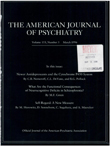Methadone maintenance outcome as a function of detoxification phobia
Abstract
OBJECTIVE: Methadone maintenance outcome as a function of detoxification phobia was examined. METHOD: Opiate addicts (N = 271) in a 1983 random sample of methadone maintenance patients from three diverse populations were studied. Subjects from an individually assessed follow-up sample (N = 102) were compared on detoxification phobia. Logistic regression analysis yielded best predictors of the phobia. RESULTS: Phobic patients were more likely to be white, female, and abstinent; to have had fewer detoxification attempts and longer periods on maintenance; to show persistence of the phobia; to meet diagnostic criteria for depressive or anxiety disorders; and to have Addiction Severity Index scores above the 75th percentile for psychological problems. CONCLUSIONS: Detoxification phobia has a complex relationship to methadone maintenance outcome. It is associated with greater abstinence for patients in methadone maintenance treatment. However, for rehabilitated phobic patients it presents a barrier to successful detoxification and a drug-free adjustment that is often associated with other psychopathology but could be ameliorated by targeted assessment and treatment.
Access content
To read the fulltext, please use one of the options below to sign in or purchase access.- Personal login
- Institutional Login
- Sign in via OpenAthens
- Register for access
-
Please login/register if you wish to pair your device and check access availability.
Not a subscriber?
PsychiatryOnline subscription options offer access to the DSM-5 library, books, journals, CME, and patient resources. This all-in-one virtual library provides psychiatrists and mental health professionals with key resources for diagnosis, treatment, research, and professional development.
Need more help? PsychiatryOnline Customer Service may be reached by emailing [email protected] or by calling 800-368-5777 (in the U.S.) or 703-907-7322 (outside the U.S.).



